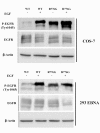Germ-line mutations in epidermal growth factor receptor (EGFR) are rare but may contribute to oncogenesis: a novel germ-line mutation in EGFR detected in a patient with lung adenocarcinoma
- PMID: 21575252
- PMCID: PMC3123322
- DOI: 10.1186/1471-2407-11-172
Germ-line mutations in epidermal growth factor receptor (EGFR) are rare but may contribute to oncogenesis: a novel germ-line mutation in EGFR detected in a patient with lung adenocarcinoma
Abstract
Background: A subset of lung cancer patients harbour EGFR somatic mutations in their tumours and are candidates for treatment with EGFR tyrosine kinase inhibitors. In a few cases EGFR mutations have also been found in the germ line, suggesting a role in lung carcinogenesis. Objetives of this study were: 1) To analyze the EGFR gene mutations in a population diagnosed with lung adenocarcinoma from Northern Spain. 2) To determine the frequency of a new germ-line mutation found in our laboratory as well as the frequency in our population of three other EGFR germ-line mutations detected by other authors. 3) To determine whether the novel mutation detected may have a functional effect on the EGFR protein.
Methods: Tumour DNA samples were obtained from frozen or paraffin embedded tumour tissues. Samples of DNA from peripheral blood cells were obtained from 912 individuals with lung cancer recruited from the CAPUA study 12, 477 unrelated healthy donor individuals and 32 individuals with other types of cancer. EGFR gene exons 18 to 21 were studied by direct standard dideoxy sequencing. Specific mutations were determined either by direct sequencing or by specific RFLP analysis. Cell lines were transfected with EGFR-mutant plasmids and analysed by western blot with antibodies specific for total or phosphorylated-EGFR.
Results: We found EGFR mutation in 12 of the 71 tumour samples (17%). One tumour contained two mutations. One mutation (p.R776G) was present as a germ line. Using an RFLP analysis, this mutation was not found in 954 alleles from healthy individuals studied, concluding that it is not a polymorphism. The mutation was not found either in genomic DNA from 912 lung cancer patients. Three additional EGFR germ-line mutations that were already described were not found in any of the studied samples. These observations show that EGFR mutated alleles are rare in the population. In vitro studies revealed that tyrosine autophosphorylation is enhanced in p.R776G-mutant EGFR when compared with wild-type EGFR. This enhanced autophosphorylation in the absence of ligand may be associated with a proliferative advantage.
Conclusions: Germ-line mutations in EGFR are rare but may contribute to oncogenesis.
Figures


References
-
- Lynch TJ, Bell DW, Sordella R, Gurubhagavatula S, Okimoto RA, Brannigan BW, Harris PL, Haserlat SM, Supko JG, Haluska FG, Louis DN, Christiani DC, Settleman J, Haber DA. Activating mutations in the epidermal growth factor receptor underlying responsiveness of non-small-cell lung cancer to gefitinib. N Engl J Med. 2004;350(21):2129–2139. doi: 10.1056/NEJMoa040938. - DOI - PubMed
-
- Paez JG, Janne PA, Lee JC, Tracy S, Greulich H, Gabriel S, Herman P, Kaye FJ, Lindeman N, Boggon TJ, Naoki K, Sasaki H, Fujii Y, Eck MJ, Sellers WR, Johnson BE, Meyerson M. EGFR mutations in lung cancer: correlation with clinical response to gefitinib therapy. Science. 2004;304(5676):1497–1500. doi: 10.1126/science.1099314. - DOI - PubMed
-
- Pao W, Miller V, Zakowski M, Doherty J, Politi K, Sarkaria I, Singh B, Heelan R, Rusch V, Fulton L, Mardis E, Kupfer D, Wilson R, Kris M, Varmus H. EGF receptor gene mutations are common in lung cancers from "never smokers" and are associated with sensitivity of tumors to gefitinib and erlotinib. Proc Natl Acad Sci USA. 2004;101(36):13306–13311. doi: 10.1073/pnas.0405220101. - DOI - PMC - PubMed
Publication types
MeSH terms
Substances
LinkOut - more resources
Full Text Sources
Medical
Research Materials
Miscellaneous

